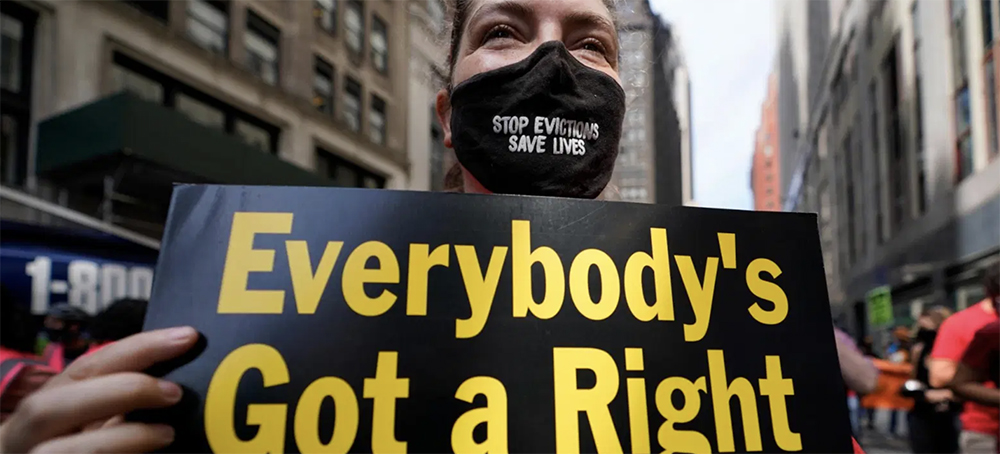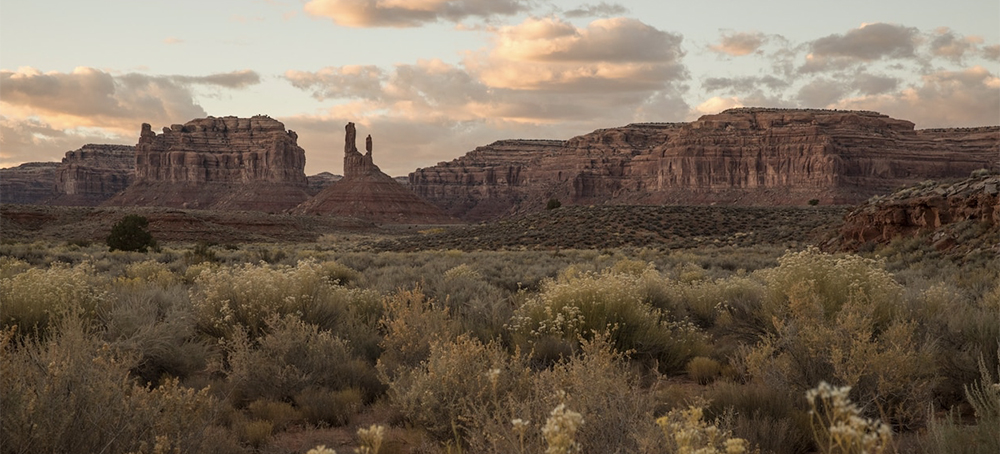Live on the homepage now!
Reader Supported News
In an interview, Mary Trump, the only niece of the former American president, talks about an uncle she describes as dangerous, his enduring power and the growing hate in America.
Trump, however, seems irritated. "This was the first time I've been treated badly in an interview," she says.
She had just appeared on "The View," a popular morning chat show, where they discussed politics, the pandemic and racism. Yet one co-host checked out of the conversation without even greeting her: Meghan McCain, daughter of the late senator John McCain, who had been reviled and insulted by Donald Trump even as he went to his grave.
The younger McCain is famous – infamous – for her own conservative tirades. After the show with Mary Trump, she tweeted: "There is no 'good' Trump family member to me."
And there it is, Mary Trump's burden: her last name.
She will be forever linked to her uncle, his lies, is hubris, his incompetence, his autocratic tendencies – and the damaging fallout from his one term as president.
Last year, the psychologist published her memoirs: "Too Much and Never Enough." The book revealed the horrific family history of the Trumps – and made her a target of Trump fanatics, who still worship the former president. For months, she hardly left the house – because of COVID-19, but also out of fear of being recognized and vilified.
Now Trump, 56, has written a second book, "The Reckoning: America's Trauma and Finding a Way To Heal." It addresses the darkest period of U.S. history, with the nation's enduring racism, and, of course, her uncle.
DER SPIEGEL: Ms. Trump, last summer you called your uncle the world's most dangerous man. Now that he's out of office, do you still feel that way?
Trump: After the election, I was happy for about a minute. I was very relieved, of course, but the number of people who voted for him was just heartbreaking. Seventy-four million! Yes, Joe Biden won. But the Democrats in general didn't win enough. We needed a total repudiation of Donald and his party, and we didn't get one.
DER SPIEGEL: So, you think he still presents a danger?
Trump: We're not out of the woods. It became clear right after the election that he was going to do everything in his power to undermine the legitimacy of the results and that the Republicans were just going to let him do it. For him, losing is not acceptable and winning doesn't mean legitimately winning, it just means getting the win. He knows he didn't win, but I don't believe he knows he lost, either.
DER SPIEGEL: How so?
Trump: He's been trying for two years to steal this election. I don't believe he can wrap his head around the fact that everything he did, all the stops he pulled out, all the stops the Republican Party pulled out for him, haven't worked. So, he's still trying to steal this election.
DER SPIEGEL: Do you see Jan. 6, when a mob of his supporters stormed the Capitol Building, as such an attempt?
Trump: He is very good at finding people weaker than he is, which is shocking because he's literally the weakest person I've ever known. But they're out there obviously, in large numbers. Then, there are people who are much smarter and powerful than he is, who know how to use him. So, it's a very dangerous combination. Were there people around him who knew that it could very possibly lead to that moment? Absolutely. Was he completely willing and comfortable to take advantage of the situation and make it worse for his benefit? Absolutely.
DER SPIEGEL: Do you think he welcomed what he saw on Jan. 6?
Trump: Oh, my gosh, yeah. It was probably one of the best days of his life. The worse it got, the happier he was. It wasn't an accident when he told the mob that if he wasn't granted the victory, it was Mike Pence's fault. So, should we be surprised that people were running around with nooses wanting to string Mike Pence up? It would have been perfectly fine with him. Absolutely. The only thing he probably regrets about that is that there wasn't more violence.
DER SPIEGEL: What went through your mind that day?
Trump: I hadn't listened to his speech beforehand, because I've tried whenever possible not to listen to him or look at him, because I don't care what he has to say. At first, like everybody else, I found it really hard to know what precisely was going on. It just looked like a mess. The first word that came to mind was tawdry. But then it became obvious to me that it was much worse than that. This is our Capitol! This is the center of – well, I don't like to say American democracy, because I don't think America has ever completely been a democracy like we aspire to be.
DER SPIEGEL: Do you think he will run again in 2024?
Trump: I don't know. But because he's being enabled, he sees an opening. He feels the power. He also knows that the only way he stays out of legal trouble is to get back into power.
DER SPIEGEL: Does it weigh on you to be so personally connected to his world? In your new book you reveal that in 2017, a few months after your uncle's inauguration, you went into inpatient treatment for post traumatic stress disorder. What happened?
Trump: I just remember feeling so out of control. I remember spinning out and didn't know how to stop. I lived in a very Republican town then, so I was really isolated. For the first time in my life, I lost friends because of an election, and I knew I needed to do something. But despite the fact that I'm a psychologist, I didn't know there were treatment programs for that. I knew there were for addictions, but I didn't know there was such a thing for post-traumatic stress.
DER SPIEGEL: Your uncle traumatized half the nation.
Trump: Every once in a while, I think about how this country will be forever stained by what he did. That's really hard. We never recover from that. Maybe in 200 years, but not while I'm alive.
DER SPIEGEL: Don't you think his spell is broken? Joe Biden's policies are pretty popular, and Trump's "Big Lie" hasn't amounted to anything.
Trump: The Democrats don't understand the seriousness of the threat. They are playing by rules in a rulebook that the Republicans lit on fire. There are no rules anymore. They need to start fighting like their lives depend on it. But they're just not willing to do that. There is an unwillingness – also in the U.S. media – to use the kind of language that is accurate and necessary to get people to understand the seriousness of the threat.
DER SPIEGEL: How serious is it?
Trump: Donald is a fascist, and the Republicans are an autocratic, anti-democratic, counter-majoritarian party that would be perfectly happy to establish some kind of apartheid in this country. They are actively trying to destroy our democracy. If they win back the House in 2022, it would be fatal to the American experiment. I wouldn't be surprised if they make Donald, two years before the presidential election, speaker of the house. And then there will never be another Democrat allowed to win an election.
DER SPIEGEL: Do you really believe that?
Trump: We see it happening already. Last year, there were 155 million presidential votes cast in this country. There have been maybe 36 cases of voter fraud, which is a vanishingly small number. And yet, we've got hundreds of voter suppression laws in place or being pushed by the Republicans. If the Democrats lose the House and/or the Senate in the 2022 midterms, it's over. It is over.
DER SPIEGEL: You don't think the U.S. democracy is resilient?
Trump: The way this country is structured is inherently anti-democratic.
DER SPIEGEL: What do you mean?
Trump: The U.S. Constitution is not a democratic document. For example, we currently have a 50-50 split in the Senate, but the 50 Republican senators represent 40 million less people than the 50 Democratic senators – because the constitution gives every state two senate seats, no matter how populous.
DER SPIEGEL: In your new book, you write: "The ugly history of our country is filled with sordid, barbaric and inhuman acts committed by average citizens which were encouraged or at least condoned by the highest levels of government. To deny this history means to deny our national trauma." That's a devastating judgement – how did you come to that conclusion?
Trump: If there's one thing Americans are very good at, it's perpetuating myths about ourselves.
DER SPIEGEL: For instance?
Trump: One of the most astonishing things this country got away with was portraying itself as a beacon of democracy during World War II, while at the same time an entire population of people was being held in what was essentially a closed, fascist state in the South. Black Americans who served their country came home only to be lynched because they had the audacity to wear the uniform. Part of that is also that people think that the North were the good guys. But a large percentage of Northerners were really racist, too, and perfectly happy to have Blacks freed, but did not want them to have any political power, so they decided that it was more expedient to make common cause with the former Confederates than with the freed men and women.
DER SPIEGEL: Isn't the way of looking at U.S. history changing rapidly?
Trump: The right is doing everything to make sure that Americans continue to stay ignorant about their own history. Imagine if post-World War II Germany hadn't taken the steps that it has taken.
DER SPIEGEL: Not all Germans back then were too excited about that, either.
Trump: That's a good point. It requires the political will. We let people off the hook for flying the Confederate flag because they claim it's just about their Southern history. But they know what it means. It means that they are completely on board with white people owning black people.
DER SPIEGEL: Is the U.S. still a racist country?
Trump: If you're a white adult American, it's almost impossible not to be racist because of the media environment we grow up in, our families or our friends' families, the influences of our education. But when you become an adult, you need to take responsibility for that stuff. If we don't acknowledge it, then it's never going to change. But it's very hard to acknowledge that.
DER SPIEGEL: How much do you blame your uncle for that?
Trump: I blame him for the fact that it's becoming more and more acceptable to be openly racist. What Donald did was prove that racism is a successful platform when you run for office in this country. People like him are out there very openly being racist and white supremacist, and they're getting tens of millions of people to vote for them because either they agree with them or they don't have a problem with it because lower taxes are more important. We're in a really dangerous place.
DER SPIEGEL: Do you also blame him for the disastrous COVID-19 situation here last year?
Trump: That's been one of the worst things for me to deal with. Knowing that your uncle is responsible for the deaths of hundreds of thousands of people is not a good feeling. That many died in exactly the same circumstances my father did, alone, because my uncle, who could have gone to the hospital to be with my dad, rather went to the movies. So, that's been really, really hard. Because of his incompetence and his cruelty we're still struggling with this. Because of his encouragement of the unvaccinated and his failure to model decent behavior, which he is incapable of doing. It's just a kick in the teeth.
DER SPIEGEL: Wasn't he one of the first to get vaccinated?
Trump: Secretly! Everybody in the family got vaccinated. They're all vaccinated. Imagine how people are going to react when they find out that they've all been betrayed and the people they put their faith in lied to them for political expediency.
DER SPIEGEL: Psychologically, how do you get people to admit they've lived a lie for so long?
Trump: It's hard. I don't hold out hope for most of these people. I really don't.
DER SPIEGEL: That sounds rather pessimistic.
Trump: I am bizarrely a quite optimistic person. Maybe that took a hit over the last couple of years. But I am pretty much an optimist. I haven't given up hope.
DER SPIEGEL: Yet the next Trump generation seems ready. Do you expect your cousin, Donald Jr., or your cousin Ivanka, to run for political office?
Trump: No.
DER SPIEGEL: Why not?
Trump: My uncle is such a buffoon, but he does have charisma. If you met him, for the first 10 seconds you would see it. After that, you would realize that he's a total psychopath, but a lot of people are very susceptible to his kind of charisma. Donald Jr. and Ivanka don't have any of that. They don't survive politically without him. They don't survive in business without him. No, I don't see that. Hopefully, they'll all end up in jail.
DER SPIEGEL: What's next for you?
Trump: My next book will not be about my uncle. I'm taking a break. Never write a book about trauma while you're still being actively traumatized.
DER SPIEGEL: Ms. Trump, we thank you for this interview.
 In this 1998 file photo, Ayman al-Zawahri, center left, and Osama bin Laden, center, hold a news conference in Afghanistan. (photo: AP)
In this 1998 file photo, Ayman al-Zawahri, center left, and Osama bin Laden, center, hold a news conference in Afghanistan. (photo: AP)
Two decades later bin Laden is dead, but those predictions have come true. And they weren’t the only ones that did.
Americans can find some small consolation, perhaps, in the fact that they managed to take revenge by hunting him down and killing him. But the bigger picture is less reassuring. Al-Qaeda still remains in Afghanistan, and its offshoots continue to wage war in others parts of the world. The rise of the Islamic State has shown that ideas even more extreme than bin Laden’s continue to find followers.
I’m not sure that the United States and the rest of the West has fully absorbed this lesson.
When I met bin Laden for the first time, in a cave in the Tora Bora mountains of Afghanistan in 1997, he predicted that the United States would soon cease to be a superpower — and surprised me by suggesting an alliance of Afghanistan, Pakistan, Iran and China against the United States and India.
The United States is still a superpower, of course. But the second part of his prediction seems to be coming true as I write. Iran has made overtures to the Taliban government, and it in turn has signaled to China that it is willing to forgive Chinese crimes against the Muslim Uyghurs in exchange for recognition and support. China has just responded by offering $31 million in emergency aid to the new Afghan government.
Bin Laden understood that the power of the United States would force its enemies to make common cause. He understood that America’s strength was also its weakness.
After 9/11, I covered wars from Iraq to Syria and from Lebanon to Palestine. Bin Laden had gained the respect of many Muslims — not because of his religious ideology but due to the U.S. occupation of Iraq and Washington’s support for puppet governments around the Islamic world. I interviewed Secretary of State Colin Powell, Condoleezza Rice, Hillary Clinton, John F. Kerry and many top U.S. military officials after 9/11. They made sweeping claims about their successes in the war against terrorism, but they seemed unaware that the war was actually producing more terror. The Islamic State is only one example of the blowback generated by the U.S. invasion in Iraq.
There is no doubt that the United States managed to hunt down and kill many top al-Qaeda, Taliban and Islamic State leaders with drones after 9/11. Yet it’s also true that the collateral damage from those attacks produced hundreds of new suicide bombers. These suicide bombers became the Taliban’s most effective weapon against U.S. and NATO forces in Afghanistan. Now the Taliban is itself facing suicide bombers from the Islamic State.
Military power can solve some problems, but it often creates more. Bin Laden wanted to provoke the United States into a massive use of military force because he understood that this would create more problems than it solved. Yet war is not the only way for a country to pursue its interests.
Washington should not repeat its past mistakes. The Americans and their allies abandoned Afghanistan after the withdrawal of Soviet troops in 1989. That tipped Afghanistan into civil war, and the Taliban was the ultimate result of that war. Now the country is on the verge of becoming a failed state yet again.
The United States can prove bin Laden wrong by forcing the Taliban to implement the Doha agreement negotiated by the Trump administration. The Americans should pressure the Taliban to stick to its promises that Afghanistan will not be used as a base for attacks against any other country. Biden administration officials are understandably unhappy about the Taliban takeover, but they should realize that they still have genuine leverage. The United States has frozen Afghanistan’s assets. The Taliban needs money to run the state. The United States should do its best to use this to force the Taliban to include women and other political groups in the country’s power structures.
It is undeniably true that the U.S. withdrawal from Afghanistan will strengthen Islamist militants everywhere. But if the Taliban fails to bring peace and security to Afghanistan, then the results might be even worse. Failed states are the most attractive bases for people such as Osama bin Laden. He moved from a weak Sudan to a failed Afghanistan in 1996, and then proceeded to plan 9/11.
In an interview in 1998, he told me that the United States could kill him but that it would never capture him alive. He was right about that, too. Let’s not allow him to be right about anything else.
 Activist rally during a demonstration and march, Tuesday, Aug. 31, 2021, in New York, to call on New York governor Kathy Hochul, Speaker Carl Heastie, and Senate Majority Leader Andrea Stewart-Cousin to extend pandemic era eviction protections in wake of Supreme Court decision lifting the moratorium. (photo: Mary Altaffer/AP)
Activist rally during a demonstration and march, Tuesday, Aug. 31, 2021, in New York, to call on New York governor Kathy Hochul, Speaker Carl Heastie, and Senate Majority Leader Andrea Stewart-Cousin to extend pandemic era eviction protections in wake of Supreme Court decision lifting the moratorium. (photo: Mary Altaffer/AP)
Landlords scored a major victory with the end of eviction bans. The path forward for organized tenants and socialists has to make prying power out of landlords’ hands a top priority.
Absent eviction protections, 7.8 million renter households behind on rent are at risk of imminent displacement.
The current crisis, while triggered by the COVID-19 pandemic, is many years in the making. More than half of US states ban rent control, and most have weak-to-nonexistent tenants’ rights. Evictions are not just about money, but also power — and the nation’s devotion to a property rights regime that gives landlords tremendous power over tenants’ day-to-day lives has laid the groundwork for the impending wave of displacement.
In the majority decision striking down the eviction moratoria, the court noted that halting evictions “intrudes on one of the most fundamental elements of property ownership — the right to exclude.” In essence, this is correct: the eviction moratoria altered commonly understood tenets of property rights in a way that dramatically reduced the power of landlords for a short time. That was a very good thing.
Property rights are considered fundamental to American society, a precondition for the “American Dream” of homeownership. But as the legacy of exclusionary zoning shows, there is no inviolable right to do what you will with your property. In fact, the government has long been willing to impose regulations on private property if doing so will maximize value for existing property owners and protect the existing social hierarchy — with white, wealthy homeowners at the top. The state will take a hands-off approach when it comes to a landlord’s decision to displace or exclude a tenant but impose rigid zoning regulations in the name of enhancing homeowners’ property values.
We have, in short, a property rights regime that is inconsistent on the question of regulation — because that inconsistency protects the wealth and power of elites at the expense of everyone else.
Only after months of public pressure during the pandemic did the federal government intervene to suspend the rights of owners to exclude, in contradiction to the foundational precepts of this property rights regime. The Centers for Disease Control and Prevention (CDC) imposed a federal eviction ban that, while not without loopholes, was historic in its scope.
But eviction moratoria are, by definition, temporary. Now, 7.8 million households remain behind on rent, and the public policy problem that led to the moratorium in the first place has not dissipated. Without intervention, we’re looking down the barrel of a mass eviction crisis.
Beyond the Moratorium
For liberals and centrists, the path out of the moratorium period is a means-tested rental assistance program that, if properly implemented, will avert the impending eviction crisis.
But implementation is already failing for two reasons. The first is that states are, so far, not requiring landlords to accept the money: landlords can forgo rental assistance in the name of their right to evict and exclude. The second is that the program is difficult to apply for, and rigorous income-testing requirements are blocking access to aid. These two factors combined mean that much of the $46 billion in federal emergency rental assistance has been slow to reach households.
Even if it were properly implemented, the liberal plan essentially returns us to the status-quo property rights regime: the precise system that has led us to the current crisis. Unless fundamentally challenged, it will continue to result in mass disempowerment and displacement.
Progressives across the country are fighting to improve rental assistance programs and ensure that many more households can stay housed. In New York, emergency rental assistance is included in the state’s source-of-income-discrimination laws, meaning that it is illegal for landlords to refuse rental assistance money. It is also illegal for landlords to pursue eviction of tenants while their rental assistance applications are pending.
In Philadelphia, landlords are unable to evict unless they have tried and failed to apply for rental assistance first — a model that Treasury secretary Janet Yellen, Housing and Urban Development secretary Marcia Fudge, and attorney general Merrick Garland are asking other states and localities to follow. States like California and New Jersey are also pursuing new eviction regulations that incentivize landlords to accept rental assistance and will keep tenants stably housed.
But these progressive interventions largely happen at the court level and only work when tenants are organized to enforce their rights. Too many evictions happen informally, and policy solutions that rely on individual tenants to take action will always leave the most marginalized households out. These solutions are also temporary, addressing only the relationship between tenants and landlords during the pandemic period in an effort to return to the pre-pandemic status quo.
That status quo was not good for tenants. Socialists and tenants’ unions should forge a different path out of the era of pandemic eviction moratoria, one that further erodes our exclusionary property regime and expands tenants’ ability to organize for stronger rights.
An Ambitious Housing Agenda
As moratoria expire across the country and rental assistance dries up, we should pursue reforms that enhance our collective power: good cause eviction protections, rent control, tenants’ rights to organize, and conversion of privately owned real estate assets into socially and democratically controlled housing.
Good cause eviction laws and rent control limit the reasons for which landlords are allowed to pursue eviction or raise rents. They allow tenants to organize unions in their homes, free from the fear of retaliatory eviction, and can therefore lead to improved living conditions as tenants fight for repairs. The state of New Jersey has had good cause eviction for decades; California, Oregon, and Albany, New York, passed good cause eviction measures more recently. This kind of measure, which encourages organizing and collective action, is what we need to permanently solve the housing crisis.
While Democrats and progressives believe the eviction crisis is caused by a temporary inability to pay the rent, socialists understand that it is also about power: landlords have too much, and tenants have too little.
By chipping away at the dominant property rights regime, we can increase the political power of renters to win a real social housing development program. If we take clear steps to curtail exclusionary property rights policies, as was done with the eviction moratorium, we can establish a new kind of relationship between landowners and tenants. Organized tenant unions can vastly increase democratic control over real estate assets. Social housing operators, perhaps cities or states themselves, could remove private property from the market and hold it in public trusts — and even build new social housing.
COVID-19 did not cause the housing crisis. It merely exposed it. The eviction moratorium, and how we navigate away from it, is a once-in-a-generation chance for a nascent national tenants’ movement to rise up and win durable policy reforms that will move us closer to socialized housing. We should use every tool at our disposal to take advantage of that opportunity.
 Fort Bliss, an army base near El Paso, Texas. (photo: Juan Carlos Llorca/AP)
Fort Bliss, an army base near El Paso, Texas. (photo: Juan Carlos Llorca/AP)
The federal employee also reported that many children at another shelter suffered from dehydration and developed gastrointestinal issues.
It's the third and latest complaint to come out of Fort Bliss, an army base near El Paso, Texas, which houses thousands of immigrant children who crossed the border without their parents. In July, the Government Accountability Project filed two complaints about Fort Bliss that included COVID-19 outbreaks due to overcrowding and contractors with no experience in working with children.
The children were housed by contractors for the Department of Health and Human Services (HHS).
In a statement, HHS said it acts quickly to concerns and has closed sites for immigrant children that didn't meet its standards. The agency also said it is their policy to quickly report any alleged instances of wrongdoing to authorities.
"Any potential incident previously reported would have led to an investigation and disciplinary action," an HHS spokesperson said. "The care and well-being of children in our custody continues to be a top priority for HHS."
"In the aftermath of our disclosures, HHS asserts that the fundamental failures our clients identified are 'old' and have been 'fixed,'" the whistleblower report states. "To the contrary, the problems are ongoing, systemic, and repeated...with tragic consequences. It is true these are old issues; it is not true they have been fixed."
The federal employee who filed the complaint on Wednesday shared their experiences while volunteering at Fort Bliss, as well as two other emergency intake sites in Houston, Texas, and Erie, Pennsylvania. Over six days in May, the whistleblower obtained emails — which were not reviewed by BuzzFeed News — to Fort Bliss managers summarizing grievances filed by children and staff, according to the letter. But the whistleblower said the issues were never remedied during the time they were stationed there.
While at the Pennsylvania International Academy facility, the whistleblower learned that many children suffered from dehydration, developed gastrointestinal issues, and refused to eat the food provided because it was inedible or unfamiliar. The federal employee also said a floor set aside for children who had tested positive for the coronavirus was understaffed, crowded, and had a gas leak.
Children were sent to the shower room at the Pennsylvania facility to remove lice, which was rampant, by gender. However, a staffer of a different gender than the children tried to remain in the shower room, the complaint states. After other employees protested, the staffer initially left, but on more than one occasion allegedly returned after the people who complained stepped out.
"The staffer then participated in the lice removal process within a few feet of where the tender age girls were showering," the whistleblower complaint states.
Echoing past whistleblower complaints, the federal employee said that at Fort Bliss they learned that of the 20 staffers on the mental health team, only two were licensed and trained in mental health work.
The complaint also states that a girl was taken to a hospital with 13 pregnant immigrants and had blood drawn without explanation despite not being pregnant. Children also reported that their skin burned or blistered from "skin lightening" lotion given to them instead of moisturizers.
Girls also said that contractors in their tents threatened to report them if they didn't want to go to a meal, telling them that their immigration judge will see the reports and send them back to their countries.
Nearly every child who met with the mental health team was also concerned that they had not yet seen a case manager who works on getting them released to a sponsor, such as a family member or friend in the US.
The concerns about not seeing caseworkers are not new.
In a previous complaint, two whistleblowers said they spoke to dozens of children who had been at Fort Bliss for more than 30 days, some approaching or even exceeding 60 days. Many of the children said they hadn't spoken to their case managers in over a month. Others said they had not been assigned to one.
HHS said that children at Fort Bliss currently meet with a case manager weekly and that the site has close to 60 mental health and behavioral counselors on the ground working with the minors.
"We have increased case management services to unite children safely and expeditiously with family, while we continue to improve and streamline this process," HHS said.
Children at Fort Bliss are there for an average of 18 days and HHS' Office of Refugee Resettlement has unified 8,000 immigrant minors with a parent or sponsor from the Texas facility, HHS said.
 The Apple logo on an iPhone alongside the Epic Games logo on a laptop, April 2021. (photo: Andrew Caballero-Reynolds/AFP/Getty Images)
The Apple logo on an iPhone alongside the Epic Games logo on a laptop, April 2021. (photo: Andrew Caballero-Reynolds/AFP/Getty Images)
A federal judge issued a permanent injunction ordering Apple to allow developers to direct users to third-party payment portals.
At issue was Apple’s practice of forcing iOS app developers to give the tech giant a 30% cut of the revenue from each and every subscription or purchase and its prohibition on apps linking to third-party payment services. In the injunction, the court found that Apple will now be required to allow developers to direct users to third-party payment processors, meaning developers can now collect revenue directly, and can no longer disallow developers from using account registration data to contact users outside the app. Per the injunction:
[Apple will be] ... permanently restrained and enjoined from prohibiting developers from including in their apps and their metadata buttons, external links, or other calls to action that direct customers to purchasing mechanisms, in addition to In-App Purchasing and (ii) communicating with customers through points of contact obtained voluntarily from customers through account registration within the app.
Apple and Epic have been locked in a bitter, years-long feud over the App Store model, which Epic claimed was an anti-competitive abuse of Apple’s monopoly on iOS devices. Epic, the developer of the wildly popular Fortnite, tried to break out of Apple’s control by installing a third-party payment option in the game in August 2020. Apple subsequently responded by blacklisting Fortnite from the App Store, triggering the massive legal battle that blew up in its face today.
The injunction is a major win for developers, but it’s very far from a complete victory. Gonzalez Rogers ruled against the gaming company on every single other count, finding that while Apple violated California’s Unfair Competition law, the case did not establish Apple to be an illegal monopolist. The court ruled in favor of Apple’s counterclaim against Epic for breach of conduct, meaning Epic has to shell out $3.65 million, or 30% of the revenue it collected between the August 2020 rollout of its non-Apple payment portal and October 2020.
Apple is also under no obligation to let Fortnite back on the App Store. On Thursday, Apple shot down Epic’s request to at least let it return to the official iOS store in South Korea, which had passed a law mandating Apple and Google remove prohibitions on alternate payment systems.
Epic, whose real aim in the case was always winning the right to open their own competing iOS store, has expressed its displeasure that the ruling didn’t go much farther. Tim Sweeney, the CEO and founder of Epic, tweeted that it wasn’t “a win for developers or consumers” and that the company is “fighting for fair competition among in-app payment methods and app stores for a billion customers.” He added Fortnite wouldn’t be returning to the App Store until there was “fair competition with Apple in-app payment and app stores” that would allow them to cut prices for players.
The injunction will take effect in 90 days. Apple could, and likely will, appeal the decision.
In an emailed statement to Gizmodo, an Apple spokesperson wrote, “Today the Court has affirmed what we’ve known all along: the App Store is not in violation of antitrust law. As the Court recognized ‘success is not illegal.’ Apple faces rigorous competition in every segment in which we do business, and we believe customers and developers choose us because our products and services are the best in the world.”
“We remain committed to ensuring the App Store is a safe and trusted marketplace that supports a thriving developer community and more than 2.1 million U.S. jobs, and where the rules apply equally to everyone,” the Apple spokesperson added.
In late August, Apple had already proposed a settlement in a separate lawsuit that would have allowed developers to use registration data such as email to inform users of ways to pay outside the App Store—which would serve as a workaround of sorts to shelling out nearly a third of every transaction to Apple but would be a far cry from the kind of changes ordered by the new injunction. In a settlement in yet another case with the Japan Fair Trade Commission announced last week, Apple conceded that it would allow developers of subscription-based apps that provide content like movies, music, newspapers, and e-books to link within the app to other payment portals. However, that settlement did not cover iOS games—a massively lucrative market for in-app purchases.
It’s not clear, as of this moment, how wide the ramifications will be beyond the App Store specifically. Google, which also booted Fortnite from its Play Store in response to Epic’s moves, is facing a similar lawsuit that has yet to be resolved.
As flagged by the Verge, Gonzalez Rogers also resolved another baffling dispute in the case: Whether or not the Fortnite character Peely the banana, who is technically naked because his bare peel is his skin, would have to wear clothes while appearing in court. The issue arose when an Apple attorney cross-examining an Epic executive quipped that Apple had opted to show Peely wearing a tuxedo in his “Agent Peely” cosmetics, as it was more appropriate for federal court. (No one wears tuxedos to court but My Cousin Vinny, but hey.) An attorney for Epic, responding to the joke, later asked the executive if there is “there anything inappropriate about Peely without clothes,” to which he responded, “It’s just a banana man.”
Gonzalez Rogers wrote in an aside in the ruling that the court agreed that “as Peely is ‘just a banana man,’ additional attire was not necessary but informative.” So that’s settled.
 Palestinian demonstrators and Israeli forces clash with Israeli forces during Friday's protests. (photo: Mohamad Torokman/Reuters)
Palestinian demonstrators and Israeli forces clash with Israeli forces during Friday's protests. (photo: Mohamad Torokman/Reuters)
"Friday will be a day of confrontation with the Israeli soldiers at roadblocks and checkpoints in solidarity with the prisoners and in rejection to the endless violations against their rights," Abu Yousef said.
Wasel Abu Yousef, a member of the executive committee of Palestine Liberation Organization (PLO), told reporters in Ramallah that all the West Bank and Gaza factions agreed to designate Friday as a day of rage.
"Friday will be a day of confrontation with the Israeli soldiers at roadblocks and checkpoints in solidarity with the prisoners and in rejection to the endless violations against their rights," Abu Yousef said.
In Gaza, Hamas and the Palestinian Islamic Jihad (PIJ) said in two separate press statements that they call on the Palestinians in the West Bank and East Jerusalem to join a day of rage on Friday. The PIJ calls on all Palestinian people to continue the state of anger and confrontation in the Palestinian territory, said Tariq Selmi, spokesman for the group in Gaza in a statement.
On Monday, six Palestinian prisoners escaped from the Gilboa prison in northern Israel through a tunnel they dug underneath the prison. Israeli authorities tightened their measures in all Israeli prisons later.
Tension and clashes between Palestinian prisoners and Israeli prison authorities continue in the prisons. For several consecutive days, Palestinians who are imprisoned in prisons such as Ofer or Ketziot have been protesting against a recent decision by the Israeli authorities, who intend to disperse 400 Islamic Jihad prisoners among prisons throughout the country.
The goal of the Prison Service is to separate the members of that organization and have only one of them in each of the prisons in the country. In reaction to the prisoners' resistance to the transfer process, the Israeli authorities canceled family visits to Palestinian prisoners until the end of the month.
 Bears Ears National Monument, in Utah. (photo: Aaron Huey/National Geographic Image Collection)
Bears Ears National Monument, in Utah. (photo: Aaron Huey/National Geographic Image Collection)
The Trump Interior Department reduced the boundaries of Bears Ears monument by about 85 percent and Grand Staircase-Escalante by nearly 50 percent. In June, Biden's Interior Secretary Deb Haaland recommended the earlier boundaries be restored, as well as rolling back another Trump-era decision allowing commercial fishing in the Northeast Canyons and Seamounts Marine National Monument off Massachusetts.
However, the letter from environmentalists noted the White House has yet to fully restore the protections more than two months after Haaland submitted her recommendations.
“Every day that passes, the threat of irreversible damage to these special places increases,” the Aug. 31 letter states. “For Bears Ears and Grand Staircase-Escalante in particular, the threats from oil and gas leasing and toxic uranium mining have been heightened in recent days with troubling steps that your own Administration has taken to both incentivize uranium mining and resume oil and gas leasing on public lands.”
Signers of the letter include the League of Conservation Voters, the Sierra Club, Greenpeace, the Grand Canyon Trust and Friends of the Earth.
In particular, the letter notes that several uranium mining claims have been made on the land in Bears Ears after the Trump administration removed protections. Many of these claims were made under the Biden administration during the boundary review process. The administration is also exploring creating a strategic uranium reserve, which the organizations say would “effectively subsidize” uranium mining and create further demand for mining claims.
Separately, oil and gas companies are eyeing more than 40,000 acres of land within the original Bears Ears boundaries for drilling. While the administration temporarily suspended new oil and gas leasing on federal lands in January, it has since resumed some leasing after a court order halting the freeze.
“Even the slimmest possibility of fossil fuel leasing within the boundaries of Bears Ears or Grand Staircase-Escalante National Monuments should be unthinkable, as leasing these nominated parcels or any other parcels within these monuments would create imminent threats to the cultural, historic, and natural treasures in the area,” the letter states.
The Hill has reached out to the White House for comment.
Follow us on facebook and twitter!
PO Box 2043 / Citrus Heights, CA 95611



No comments:
Post a Comment